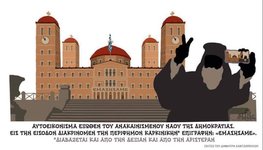Evil, all...its sin...is still...alive!
A, he rose...ye eyesore, ha!
These are palindromes made up during a church service by the priest's adolescent (and wonderfully twisted) daughter.
Do I leave them alone and use a footnote or do I render them with the likes of:
Σος ειμί, τίμιε σος.
Σοφά ται και μη, γη μια και ταφος.
...?
A, he rose...ye eyesore, ha!
These are palindromes made up during a church service by the priest's adolescent (and wonderfully twisted) daughter.
Do I leave them alone and use a footnote or do I render them with the likes of:
Σος ειμί, τίμιε σος.
Σοφά ται και μη, γη μια και ταφος.
...?


